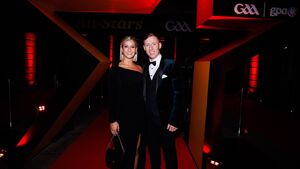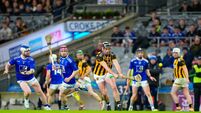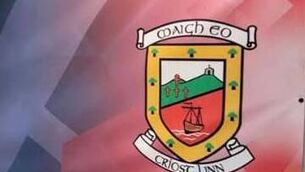All-Star tradition is losing some of its shine

Mayo footballer Ryan O’Donoghue with Courtney O’Donnell at last Friday night's 2024 GAA/GPA PwC All-Star Awards which were held at the RDS in Dublin. Picture: INPHO/Tom Maher
When the idea was conceived in 1971, it was refreshingly novel and compelling. A panel of GAA journalists, who would ultimately choose the All-Stars, had put forward the idea to Central Council. And the authorities immediately approved.
The inaugural All-Stars ceremony at the Intercontinental Hotel in Dublin was by all accounts a star-studded affair. Proud young men in tuxedos, from all corners of the country, filled the banquet room, beaming with the honour of being in the first class inducted into this prestigious Hall of Fame. Even looking back at the sepia-tinted images of the night, it is clear that all in attendance could sense the importance of the occasion, that this was the beginning of a new tradition that would capture the heart and heft of Gaelic Games, that would make the shivering winter training sessions on rock-hard pitches and the brutal hits in the heat of summer somewhat worthwhile. It was no surprise that the initiative garnered widespread support.
To bring even further gravitas to proceedings, An Taoiseach Jack Lynch was on-hand to lend the event a touch of political and cultural weight. Had the idea been spawned a few decades earlier, he would've been no stranger to the All-Stars stage. And that thought probably wasn't lost on him on the night as he mixed with some of the best hurlers and footballers in the country at the time.
Among those honoured on the night was Johnny Carey from Bangor Erris. Even though the sticky corner-back had only ventured as far as the Connacht semi-final with Mayo that year, he had shown enough grit across those Connacht championship games to earn his place in the line-up. In those early summer games against Leitrim and Galway, he still managed to score 1-2 from the full-back line. He was almost impossible to overlook, regardless of the lack of success for Mayo.
Nine counties were represented on that year's All-Star football team, with Galway and Offaly, the All-Ireland finalists, each providing four players. Seven counties were represented on the hurling line-up. There were therefore few complaints, with most recognising the positives in commencing a tradition that seemed both ancient and fresh. But these days, the breadth of county representation in the annual All-Star teams of the year feels like a shadow of its former self. Last week’s football team of the year featured players from just five counties – Armagh, Galway, Donegal, Tyrone and Louth. The hurling team of the year featured players from three counties – Clare, Cork and Limerick.
It's an excessively narrow pool that, for all its undoubted talent, hardly reflects the richness of the sports’ reach beyond the last few weeks of the season. In fact, the five-county spread in this year’s and last year's teams of the year were outliers, a break from what has now become routine. Players that fail to make the semi-finals are rarely walking away from the annual ceremony with statuettes.
The All-Star ceremony has become a sort of post All-Ireland final banquet with a few additional representatives from other teams for good measure. And though they are meant to honour the best players of the year, they increasingly cast aside exceptional campaigns that fall just short of glory – or those players that brought their county above and beyond what was expected of them throughout the year.
Ryan O'Donoghue was perhaps the most glaring omission from this year’s All-Stars line-up. His is a case that lays bare the imbalance in how the awards are decided. Mayo may have failed to reach the final eight of the championship in 2024 after losing on penalties to Derry in Castlebar, but O’Donoghue's contribution was undeniably crucial in getting the side that far in the first place.
With a tally of 3-48, he finished the year as the championship's top scorer, a remarkable feat for a forward from a team that failed to reach Croke Park. He recorded an average of eight points across seven games, finishing 25 points ahead of any player that played in Croke Park on All-Ireland Final Day. It's ludicrous that such a player was left off this year's team. But he wasn't the first – and it's a pattern that will likely continue again next year and beyond.
O’Donoghue's performances embodied the kind of individual excellence that these awards are meant to honour. He was a force of consistence throughout a year when Mayo haven't been playing their very best football. He should've been among the first names selected, and served as a reminder of the championship’s individual brilliance beyond the predictable glow of the final stages.
But there doesn’t appear to be any clear rationale guiding the All-Stars selection process. Or perhaps those voting simply do not gorge on Gaelic games over the long summer stretch, their attention instead narrowing in on the championship as it nears its climactic close. And who could blame them? Both football and hurling are struggling to captivate the public beyond the biggest days in Croke Park, the overall product clearly in need of serious attention.
This raises a fundamental question: are the All-Stars a fitting conclusion to the championship as it's currently structured? In a league format, where each team faces an equal slate of matches, selecting the best feels straightforward. But in a knockout championship that places so much of the spotlight on the sides that reach the final, can we really say that the eventual All-Stars represent the season’s best 15 players in the country? Or is it a case of recency bias, a recognition of the important players in teams that made it furthest, or that happened to march all the way to All-Ireland Sunday?
The concept, undoubtedly, is well-meaning. But the All-Stars are beginning to feel like a relic, a tradition rooted in pride, yet out of step with the realities of a game that exists beyond a few weeks towards the end of every summer.




